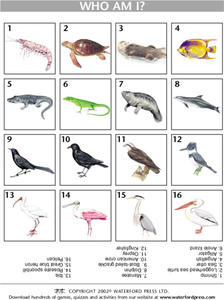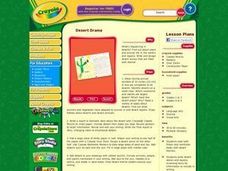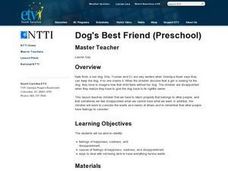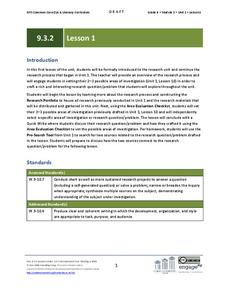Larson Lab
Animal Classification
How are animals classified? Scholars explore animal classification by observing non-living and living specimens. They learn how to organize animals into vertebrates and invertebrates and identify the five vertebrate groups: mammals,...
Curated OER
Pumpkins
Observe the differences between the inside and outside of a pumpkin. Learners discuss what pumpkins are used for and then view a pumpkin. Next, they view the inside of the pumpkin and draw the differences they see.
Curated OER
Who Am I?
Young biologists can see pictures of animals, fish, sea life, plants, and more. They match up the name of the animals that appear at the bottom of the worksheet with the actual animal. Very nice worksheet!
Curated OER
Who Am I?
Young biologists can see a variety of animals, amphibians, mammals, insects and clearly identify them. They match up the animals' names with the picture. The pictures are clear and colorful! A very nice worksheet for early elementary...
Curated OER
Adaptations to Niches and Habitats
Life science learners measure and record traits of seeds, leaves, and their own hands and then graph the data to find a continous distribution curve. They compare and color diagrams of seven different animals' forelimbs (not included),...
Curated OER
Desert Drama
Students read both fiction and nonfiction books with desert themes. Then they write desert stories and reports, reviewing texts for information to include in writing. Students also design desert scenes with details and setting elements...
Curated OER
ABC and 1-2-3 Farming
Students demonstrate how to alphabetize animal names. In this word study lesson, students identify animals that live on the farm and conduct a favorite farm animal survey. Students order animal pictures in alphabetical order.
Curated OER
Dog's Best Friend
Students learn about and identify feelings of happiness, sadness and disappointment. In this feelings lesson plan, students have a show and tell time about their pets and discuss how it would feel if they lost their pet. Students watch a...
Curated OER
Ocean Exploration: Shapes and Patterns Under the Sea
So many shapes in our vast oceans. Young explorers can discover new shapes in a variety of ways in this lesson. One way is having free exploration with a pattern shape kit handed out by the teacher. Another is by viewing a...
Curated OER
Adding to Sorted Groups
First graders sort pictures of animals into categories. In this sorting lesson plan, learners use the book On The Farm to categorize their animals.
Hawaiʻi State Department of Education
Exploring Environments
Different animals live in distinct and specialized environments. Learners will discuss organisms and environments, and then create some using their dramatic art skills. They all act like animals in a marine environment. When they are...
EngageNY
Grade 9 ELA Module 3, Unit 1, Lesson 5
Ninth graders study the study of animals in an informational text lesson plan that focuses on analyzing text structure. As learners continue reading the first chapter of Temple Grandin's Animals in Translation, they form inquiries and...
EngageNY
Grade 9 ELA Module 3, Unit 1, Lesson 3
To what extent can the surrounding environment influence one's behavior? Temple Grandin explores her connection to animals and her unique ability to understand their behavior with a lesson plan focusing on her book, Animals in...
EngageNY
Grade 9 ELA Module 3, Unit 2, Lesson 1
High schoolers apply sophisticated research skills to an inquiry-based project connected to Temple Grandin's Animals in Translation. Working from the prior unit and the model areas of investigation, including animal intelligence,...
BioEd Online
Skeletal Structures
What better way to study the structures of organisms than by creating a new being? After considering different types of skeletal supports (exoskeleton and endoskeleton), budding biogeneticists work together to create their own animals -...
Cornell Lab of Ornithology
Jump, Glide, or Fly? Exploring Bird Evolution
How have birds evolved from prehistoric animals? With the three-part lesson, small groups first research different prehistoric animals and determine whether they are birds. Then, scholars explore different bird adaptations using the Flap...
Curated OER
Shoe Box Turtles
Turtles are the stars of the show in a creative lesson designed for very young learners. In it, learners are shown pictures of real turtles. They discuss the shell and the head, then they compare them to other animals. Pupils are given a...
Curated OER
Word Search: Common Pond Mammals
Mammals who live in pond environments are the focus of this colorful wordsearch. In it, youngsters find the names of 13 mammals who are found near ponds. Each of the animals has a colorful picture associated with it. Very nice.
Curated OER
Word Search: Common Amphibians and Reptiles
Youngsters find these common amphibians and reptiles in this word search. Each of the animals has an accurate representation on the worksheet. There is an answer key at the bottom of the page. A nice, colorful word search.
Curated OER
Who Am I?
This worksheet allows learners to see animals and reptiles, and also clearly identify them. There are bats, rats, and more. Here you will find 16 clear and colorful pictures which children must match up with their animal names. This...
Curated OER
Who am I?
Here's a worksheet that has a variety of animals pictured. Learners must cut and paste the correct name and glue it in the box with the pictured animal. Great for young learners. An answer key is included on the worksheet.
Curated OER
What Flies?
Young learners consider what flies and what kinds of sounds airplanes, animals, etc. make when they fly. They also get to generate a brainstorm list. Children discuss what the categories should be once the list is completed. Some really...
Curated OER
Thumbprints
Thumbprints are fascinating! Here is a clever lesson that allows kids to discover that everyone has a unique thumbprint - no two are alike! They use magnifying glasses to closely observe their own, and someone else's thumbprints. Then,...
Curated OER
Cells and Chemical Changes
The billions of cells that make up all living things are the focus of this resource. Understanding the differences between the cells that make up plants and animals is an important distinction; it is covered here quite-well. Some...
Other popular searches
- Farm Animals
- Zoo Animals
- Nocturnal Animals
- Prehistoric Animals
- Arctic Animals
- Jungle Animals
- Plants and Animals
- Desert Animals
- Animals and Their Habitats
- Oviparous Animals
- Classification of Animals
- Winter Animals























